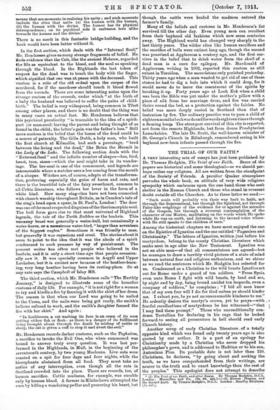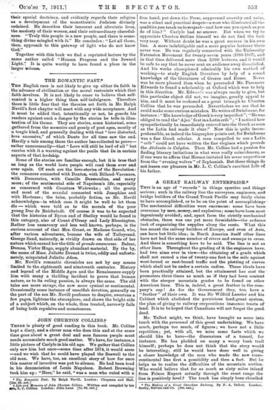THE TRIAL OF OUR FAITH.*
A VERY interesting seta of essays has justhesn.published. by Dr. Thomas Hodgkin, The Trial of our Faith. Seme of the papers are historical and some theological -or we should. per-
hape rather say religious. All are written from. the standpoint
of the Society of Friends. A peculiar Quaker atmosphere pervades the whole book, an attitude of very wide religious
sympathy which embraces upon the one hand those who seek shelter in the Roman Church and those who stand in reverent doubt outside all the Churches. As to these latter we read:— " Such souls will probably win their way back to faith, not through the Supernatural, but through the Spiritual, not through Paley-like weighings of the evidence for or against the miracles of the Gospels, but through a reverent contemplation of the character of our Master, meditating on the words which He spoke while He was on. earth, and listening to the inward voice where- with He still speaks to the children of man."
Among the historical chapters we have most enjoyed the one on the Epistles of Ignatius and the one entitled "Paganism and Christianity." The letters of Ignatius, written just before his martyrdom, belong, to the scanty Christian literature which ranks neat in age after the New Testament. Ignatius was
not an able man—of that all commentators are agreed—but he manages to draw, a terribly- vivid picture of a state of mind between natural fear and religions enthusiasm, and we shiver as we read the sentences which Mr. Hodgkin has selected for
us. Condemned as a Christian to the wild beasts Ignatius set out for Rome under a guard of ten soldiers. "From Syria even unto Rome I fight with wild beasts, by land and sea, by night and by day, being bound amidst ten leopards, even a company of soldiers," lie complains ; "I bid all men know that of my own free will I die for God unless ye should hinder me. I exhort you, he ye not an unseasonable kindness to me."
He ardently desires the martyr's crown, yet he prays—with fearful recollections of martyrdoms he has witnessed—"that I may, find them prompt." Those who unconditionally con- demn Tertullian for declaring in his rage that he looked
forward.to seeing all persecutors in hell should read- early
Church history.
Another scrap of early Christian literature, of a totally opposite kind which was found only twenty years- ago is also quoted by our author. It is a part of an apology for Christianity made by a Christian who never dropped his philosopher's gown, and is addressed to Hadrian or- to his son, Antoninus Pius. Its probable date is not later than 150.
Christians, he declares, "by going about and seeking the truth, as we have comprehended from their writings, are nearer to the truth and to exact kleowledge than the rest of the peoples." This apologist does not attempt to describe
(1) The Trial of our Faith, and other Essays. By Thomas Hodgkin, D.C.L. London: Macmillan and Co. [7s. Bd. net-1—(2) Homan Progress and the Inward Light. By Thomas. Hodgkin, D.C.L. Laudon : Headley Brothers. [1s. net.)
their special doctrines, and evidently regards their religion as a development of the monotheistic Judaism divinely ordained. He describes their innocent and altruistic lives, the modesty of their women, and their extraordinary cheerful- ness. " Truly this people is a new people, and there is some- ! thing divine mingled with it." He concludes : " Let all those, then, approach to this gateway of light who do not know God."
Together with this hook we find a reprinted lecture by the same author called " Human Progress and the Inward Light.7 It is quite worthy to have found a place in the larger volume.































































 Previous page
Previous page